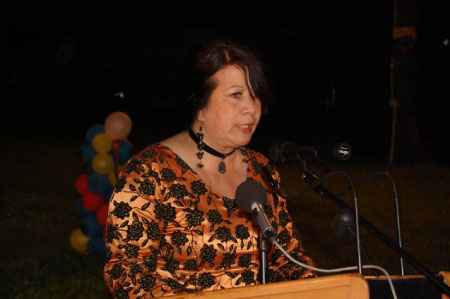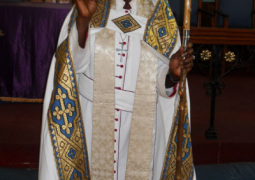
The embassy of the Bolivarian Republic of Venezuela in Banjul on 19 April celebrated the country’s 202 years of independence, freedom and liberty from the Spanish crown, which colonized the North American state.
The celebration, held at the Kairaba Beach Hotel in Kololi, brought together senior government officials, cabinet ministers, members of the diplomatic and consular corps, the private sector, as well as the media and civil society representatives.
The Venezuelan declaration of independence, according to officials of the embassy, is a statement adopted by a congress of Venezuelan provinces on 5 July 1811, through which Venezuelans took the decisions of breaking away from the Spanish crown; establishing a new nation based on the premises of the equality of individuals, abolishing censorship and focusing on dedication to freedom of expression.
Addressing those present at the occasion, the Venezuelan Ambassador to The Gambia, Loudes Perez, told the gathering mainly of Venezuelan residents of The Gambia and government officials as well as other foreign diplomats: “The government of the Bolivarian republic of Venezuela thinks of this glorious day as living process in which all Venezuelans have their share in order to continue the Bolivarian project initiated on a day like this 202 years ago.
The struggle goes on to keep being an independent and sovereign country.
Two centuries ago, she explained: “Our America woke up to find independence and freedom without empire or colonialism. Today Latin-American countries are trying actively to achieve Simon Bolivar’s dream of reaching sovereignty through regional cooperation under the principles of respect for the self-determination of their peoples, respect for religious, culture and government, respect for diversity.
“This new paradigm is characterized by prioritizing full sovereignty over oil, aimed at achieving a true nationalization of this resource. Thus, we reaffirm our ownership over the subsurface oil of the nation and reassert control over the oil industry, both from the standpoint of the legal and tax system and total control over the national oil industry.”
She added that this policy has improved the capture of oil revenues and continues to contribute to a significant increase in resources invested in social programmes.
According to the chief Venezuelan diplomat,the sovereignty has allowed them to manage their own social and economic policies to achieve under the principles of equity belonging to the political ideal of our liberator Simon Bolivar, a social justice that offers to the people ‘la mayor suma de felicidad possible’ (which means, the major happiness possible to everyone).
Ambassador Perez told diplomats at the occasion that her country has increased its gross national product per capita tremendously and workers are able to improve their standards of living, more than what obtained in the last forty years of the so-called ‘democracy representative’.
She said further: “Our political government system, as it is defined in the principles of our constitution, for the first time was written and approved with the participation of all Venezuelans, in which Venezuelan people exercising their power of creation and invoking the protection of God, the historic example of our liberator Simon Bolivar and the heroism and sacrifice of our aboriginal ancestors, through a referendum.
“We can find it defined in article one, our political system as irrevocably free and independent. Furthermore, independence, liberty, sovereignty, immunity, territorial integrity and national self/determination are unrenounceable rights of the nation.”
Ambassador Perez indicated that with the arrival of the Bolivarian revolution, the quality of life for most Venezuelans has been boosted, social inequalities have been reduced significantly and Venezuela has made important steps in the struggle to reach the real conditions of a developed country.
“During the administration of the Bolivarian government led by President Hugo Chavez, the extreme poverty rate significantly fell from 42% in 1998 to 9.5%. This result allowed Venezuela to achieve in advance this UN millennium goal. General poverty was also significantly reduced, from 50.5% in 1998 to 33.4% in 2008,” she said, adding: “Venezuela’s human development index also increased from a 0.69 (medium development) in 1998 to 0.84 (high development) in 2008. Currently, Venezuela ranks 67 out of 179 countries, according to the 2008 UNDP report.”
Dilating on the country’s economic development, she said the Venezuelan economy has experienced 20 consecutive quarters of growth.
The year 2004 stands out with an historical growth of 18.3%. The 2008 rate of growth was 4.9%. “Our economy has grown by 526.98% compared to the Venezuelan economy in 1998,” she said.
She announced that public debt dropped from 73.5% of GDP in 1998 to 14.4% in 2008, placing the national deficit as one of the lowest in the world.
In 1998, a debt of $3 billion was paid off to the International Monetary Fund (IMF) and the World Bank.
She said Venezuela has the fourth largest economy in Latin America after Brazil, Mexico and Argentina, adding that to guarantee the country’s food security and sovereignty, the Bolivarian government created ‘mission food’, whose aim is to offer basic foodstuffs to the Venezuelan population at low prices and without intermediaries.
“During the 13 years of revolution, the Bolivarian government has been breaking free from paradigms, beating obstacles, exceeding all expectations, facing empires, revolutionizing consciousness, beating foreign and internal propaganda, and even more, defending, as the engine and fuel of the revolutionary project, the deep conviction that the human being is the centre and principle of the society,” she continued.



